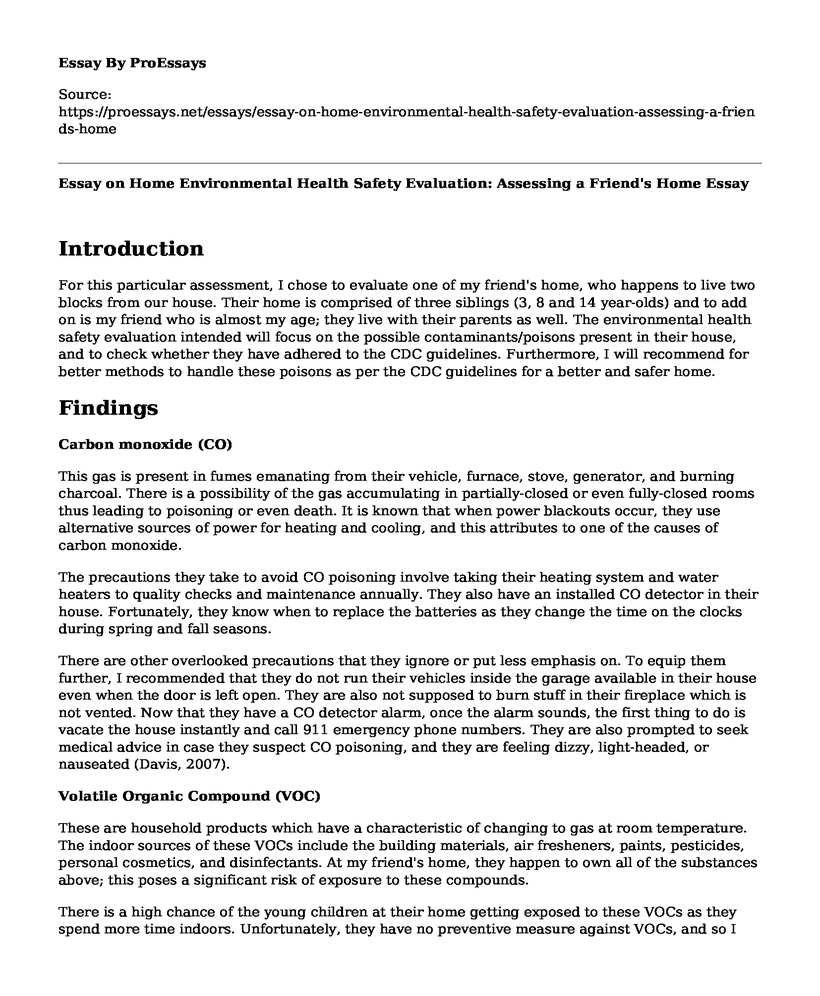Introduction
For this particular assessment, I chose to evaluate one of my friend's home, who happens to live two blocks from our house. Their home is comprised of three siblings (3, 8 and 14 year-olds) and to add on is my friend who is almost my age; they live with their parents as well. The environmental health safety evaluation intended will focus on the possible contaminants/poisons present in their house, and to check whether they have adhered to the CDC guidelines. Furthermore, I will recommend for better methods to handle these poisons as per the CDC guidelines for a better and safer home.
Findings
Carbon monoxide (CO)
This gas is present in fumes emanating from their vehicle, furnace, stove, generator, and burning charcoal. There is a possibility of the gas accumulating in partially-closed or even fully-closed rooms thus leading to poisoning or even death. It is known that when power blackouts occur, they use alternative sources of power for heating and cooling, and this attributes to one of the causes of carbon monoxide.
The precautions they take to avoid CO poisoning involve taking their heating system and water heaters to quality checks and maintenance annually. They also have an installed CO detector in their house. Fortunately, they know when to replace the batteries as they change the time on the clocks during spring and fall seasons.
There are other overlooked precautions that they ignore or put less emphasis on. To equip them further, I recommended that they do not run their vehicles inside the garage available in their house even when the door is left open. They are also not supposed to burn stuff in their fireplace which is not vented. Now that they have a CO detector alarm, once the alarm sounds, the first thing to do is vacate the house instantly and call 911 emergency phone numbers. They are also prompted to seek medical advice in case they suspect CO poisoning, and they are feeling dizzy, light-headed, or nauseated (Davis, 2007).
Volatile Organic Compound (VOC)
These are household products which have a characteristic of changing to gas at room temperature. The indoor sources of these VOCs include the building materials, air fresheners, paints, pesticides, personal cosmetics, and disinfectants. At my friend's home, they happen to own all of the substances above; this poses a significant risk of exposure to these compounds.
There is a high chance of the young children at their home getting exposed to these VOCs as they spend more time indoors. Unfortunately, they have no preventive measure against VOCs, and so I had to recommend some. They need first to obtain education regarding these household products which contain VOCs. The National Library of Medicine includes a Household Product Database which includes names of the household chemicals and their effects on people. It would be good to refer to that list before purchasing any chemical (Davis, 2007).
As for now, they have to reduce the usage of household products daily. They should opt for safer cleaning methods such as the use of baking soda and vinegar instead of disinfectants. They are also to choose cosmetics wisely and use low VOC paints for indoor painting.
Radon
The other poisonous compound I assessed is the presence of Radon. Radon is a radioactive gas which accrues from the decay of uranium in the soil. At my friend's home, none was aware of the existence of such a harmful contaminant. I helped them crosscheck whether there is radon in the area, which we verified its presence from a database of the radon quantities in our vicinity. The percentage of radon was quite significant; 4pCi/L. I made them realize that the radon gas finds its way through the ground and enters homes via cracks and holes, water pipes, gas lines, and other open areas. Radon also finds a way through well-water.
To provide them with a safer approach for prevention from radon, I urged them to inform the relevant authorities (Department of Health and Human Services) who would offer them more precise protective measures (Nazaroff & Teichman, 1990). The appropriate bodies were also to test the well water they used as it could also contain radon.
Conclusion
The evaluation was thorough, and I made sure to crosscheck all potential hazards in my friend's home. It is good that they are aware of some of the standard housing hazards that many people have little knowledge about. I believe there should be an emphasis on primary prevention home intervention programs which can equip families with the necessary expertise, supplies, and resources to minimize environmental home-based hazards. By doing so, then we shall be growing a healthy and productive lifestyle. Prevention procedures against carbon monoxide gas, volatile organic compounds, and radon need to be advocated for in many homes.
References
Davis, A. (2007). Home environmental health risks. OJIN: The Online Journal of Issues in Nursing, 12(2). Retrieved from http://ojin.nursingworld.org/MainMenuCategories/ANAMarketplace/ANAPeriodicals/OJIN/TableofContents/Volume122007/No2May07/HomeEnvironmentalHealthRisks.html
Nazaroff, W., & Teichman, K. (1990). Indoor radon: exploring US federal policy for controlling human exposures. Environmental Science & Technology, 24(6), 774-782. Retrieved from https://pubs.acs.org/doi/abs/10.1021/es00076a600?journalCode=esthag
Cite this page
Essay on Home Environmental Health Safety Evaluation: Assessing a Friend's Home. (2022, Dec 29). Retrieved from https://proessays.net/essays/essay-on-home-environmental-health-safety-evaluation-assessing-a-friends-home
If you are the original author of this essay and no longer wish to have it published on the ProEssays website, please click below to request its removal:
- Love Just a Coincidence - Movie Description Example
- Michael William Masser: Musician Biographical Paper
- Renaissance Architecture Research Paper Example
- Research Paper on Mark Zuckerberg
- Light and Darkness Symbolism Essay
- The Godfather - Movie Analysis Essay
- Essay Example on the Impact of Media on Society







